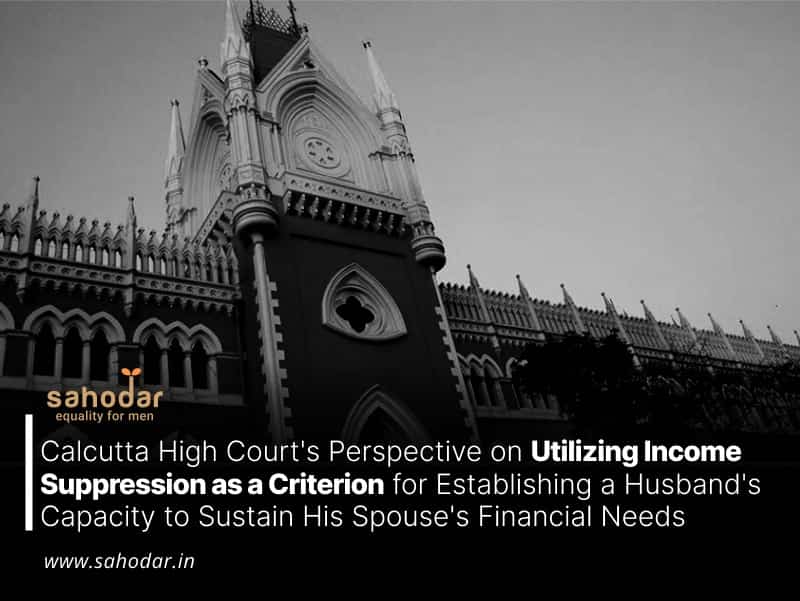In the case at hand, the husband’s contradictory statements about his employment and dependency on others for income created doubt about his actual income, led to affirmation of maintenance order.
Calcutta High Court:
In a revision application contesting the order related to a case filed under Section 125 of the Criminal Procedure Code, 1973 (CrPC) concerning maintenance, a single-bench comprising Justice Bibhas Ranjan De opined that the husband bears a legal obligation to disclose his precise income before the Court, emphasizing the importance of this duty. The court’s observation is as follows:
“Suppression of income can be a vital tool to come to a conclusion that petitioner/husband being an able-bodied person has sufficient income to maintain his wife.”
The Court, hence, upheld the maintenance order.
Brief Facts
In the present case, the petitioner has lodged an appeal challenging the judgment rendered by the Family Court in Calcutta on August 10, 2017. The aforementioned judgment pertains to a matter brought under the purview of Section 125 of the Code of Criminal Procedure (CrPC). Within this context, the petitioner disputes allegations made by the wife (referred to as opposite party 2) regarding various forms of mistreatment, encompassing physical and psychological abuse, attributed to the petitioner.
The wife asserts that the matrimonial union, solemnized under the Special Marriage Act, 1954, on July 10, 2008, was beset by adversities. Moreover, she contends that despite her husband’s monthly earnings amounting to Rs. 40,000, he failed to provide financial support. Conversely, the petitioner vigorously contests these claims, refuting all allegations and maintaining that the wife voluntarily abandoned their shared domicile merely five days subsequent to their nuptials.
Following a comprehensive scrutiny of the evidence presented, the Family Court issued an order mandating the petitioner to remit a sum of Rs. 10,000 per month to the wife, with payments due within the initial 15 days of each subsequent month.
Contentions
The petitioner’s contention revolves around the timing of the wife’s application under Section 125 of the Code of Criminal Procedure (CrPC). The petitioner asserts that the wife submitted her application four years after voluntarily leaving the matrimonial home, thereby positing that her claim should be regarded as irrelevant. It is further contended that the judge’s decision was marred by the consideration of extraneous factors and deviated from established legal principles. Additionally, the petitioner maintains that the wife’s voluntary departure from the matrimonial abode, accompanied by the removal of her belongings and her reluctance to return without valid cause, renders her ineligible for maintenance.
Moreover, the petitioner contends that the wife is gainfully employed and earns a monthly income of Rs. 10,000, establishing her self-sufficiency and disqualifying her from seeking financial support. The petitioner also questions the substantial maintenance award by the judge, asserting that the wife’s claims concerning the husband’s ownership of shops lack specificity and fail to be substantiated by corroborative documentation.
Conversely, the respondent relies upon evidence presented by the petitioner’s brother-in-law to argue that the wife left her matrimonial home due to adverse circumstances. Furthermore, it is contended that the available evidence lacks credibility regarding the wife’s income, and the husband has failed to furnish relevant documents in this regard. The respondent also underscores the petitioner’s admission during cross-examination, wherein he acknowledged his unemployment, thereby casting doubt upon his financial capacity.
Court’s Decision
The Court duly acknowledged the legal marital status of both parties and discerned no compelling evidence substantiating the wife’s alleged willful abandonment of her husband in the absence of valid justifications.
Concerning the assessment of the wife’s financial capacity, the Court encountered a dearth of credible evidence available to ascertain her income. In relation to the husband’s financial position, the Court observed conflicting statements within the testimonies of the witnesses, generating reasonable doubts about the veracity of the husband’s reported income.
The Court underscored the husband’s obligation to disclose his income if he indeed possessed one. Therefore, taking into consideration prevailing inflation and the evidentiary record, the Court declined to intercede with the maintenance order rendered by the Family Court. Consequently, the revision application was denied.

